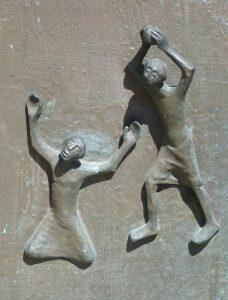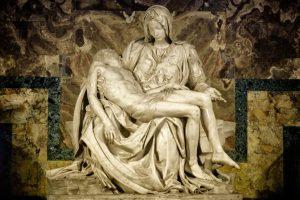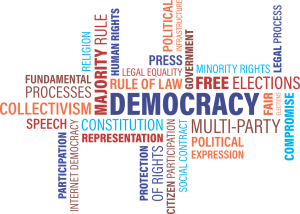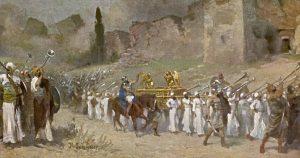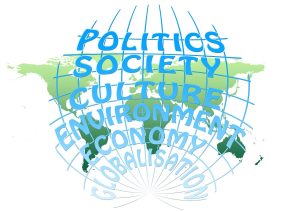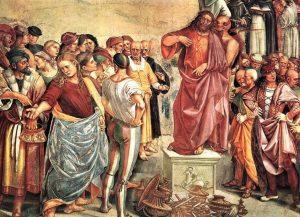The Old Testament Book of Genesis explains that Adam and Eve’s sons, Cain and Abel, had both made offerings to God. Abel’s offering was accepted by God because it was made in faith and with a sincere heart. Cain’s offering was not accepted because it was not offered in the “right spirit.” This rejection of Cain’s offering made him angry and jealous of his brother.
(Genesis 4:1-8)1NIV New International Version Translations – “Now Abel kept flocks, and Cain worked the soil. In the course of time, Cain brought some of the fruits of the soil as an offering to the Lord. And Abel also brought an offering—fat portions from some of the firstborn of his flock. The Lord looked with favor on Abel and his offering, but on Cain and his offering, he did not look with favor. So Cain was very angry, and his face was downcast. Then the Lord said to Cain, ‘Why are you angry? Why is your face downcast? If you do what is right, will you not be accepted? But if you do not do what is right, sin is crouching at your door; it desires to have you, but you must rule over it.’ Now Cain said to his brother Abel, ‘Let’s go out to the field.’ And while they were in the field, Cain attacked his brother Abel and killed him.”
Murder is the killing of another person without justification or excuse. In today’s laws, murder is a term reserved for the crime of killing a person with malice aforethought or extreme indifference to the value of human life. We find murder everywhere. In our crime-ridden cities, through the growing use of drugs, attitudes on our highways, lack of enforcement at our borders, and especially within our “Reproductive Health Clinics.” Just like with Cain and Abel, murders still occur because of jealousy, anger, and sin. God warned Cain about the consequences of his actions. God also warns us today about the destructive power of jealousy and the importance of controlling one’s sinful impulses. What can we learn from this Bible first?
Understanding Jealousy
At the root of jealousy, we usually find feelings of inadequacy or low self-esteem. These feelings are typically spawned by comparing oneself to others. We see this in God’s warning to Cain:
(Genesis 4:6) – “Then the Lord said to Cain, ‘Why are you angry? Why is your face downcast? If you do what is right, will you not be accepted? But if you do not do what is right, sin is crouching at your door; it desires to have you, but you must rule over it.’”
Cain’s sin was not an accident. He was jealous of his brother. From this passage, we can surmise that Cain became angry and jealous because he perceived that God favored Abel’s offering over his own. There was also a quality issue with Cain’s offering. “By faith, Abel offered to God a more excellent sacrifice than Cain” (Hebrews 11:4). This does not mean God was arbitrary about the offerings. God is always reasonable because He is the creator of reason. If God’s actions seem in conflict with or transcend humanity’s sense of “reason,” that doesn’t mean God is wrong. God’s thoughts are not our thoughts, and His ways are not our ways (Isaiah 55:8). Cain was cautioned about his “heart” and “faith.”
Cain’s jealousy and anger eventually led him to commit the tragic act of murdering his brother Abel. Our Bible depicts Cain’s attitude as one of resentment, ultimately resulting in the heinous act of history’s first murder. Despite God’s constant warnings, humans have a natural tendency to compare themselves to others. Individuals with low self-esteem are often more susceptible to jealousy. Past experiences of rejection and abandonment can also amplify someone’s feelings of jealousy. God’s warning to Cain addressed the heart of the issue. Cain’s perception of unfair treatment made him believe that Abel was receiving preferential treatment. Cain resented that! Cain did not trust God’s judgment!
In the age of social media, constant exposure to amplified, positive aspects of others’ lives can lead to increased social comparison. If someone perceives others as having more success, happiness, or possessions, it can trigger feelings of inadequacy and jealousy. Social media showcases people’s best and worst moments. Don’t forget that our world is also competitive. Whether at work, in our relationships, or even in our achievements, the fear of being surpassed or outperformed can generate feelings of inadequacy. Add the risk of misinterpretation of interactions or lack of clear communication in relationships, and jealousy can take root quickly.
(James 3:14-16) – “But if you harbor bitter envy and selfish ambition in your hearts, do not boast about it or deny the truth. Such ‘wisdom’ does not come down from heaven but is earthly, unspiritual, and demonic. For where you have envy and selfish ambition, there you find disorder and every evil practice.”
James, Jesus’ brother, warned against allowing envy and selfish ambition to take root, as it can lead to disorder and destructive behavior. The Apostle Paul spoke about the negative influence of jealousy within a community and suggested that it reflected a worldly and immature mindset (1 Corinthians 3:3). King Solomon even warned about the destructive nature of jealousy and how it could negatively impact one’s well-being (Proverbs 14:30). Whether jealousy comes from the fear of losing someone or something as important as a romantic partner, a friend, a job, a position of authority, or even power, lurking somewhere is a lack of trust. Prior experiences of betrayal or hurt often contribute to our feelings of inadequacy. Finally, add to these thoughts above social media’s propensity to summarize even the most complex issues into sarcastic and terse commentary. No wonder there are so many misunderstandings in our world.
(Exodus 20:17) – “You shall not covet your neighbor’s house. You shall not covet your neighbor’s wife, or his male or female servant, his ox or donkey, or anything that belongs to your neighbor.”
The tenth commandment speaks to the root of jealousy and covetousness, urging people to avoid desiring what others have. Yes, our world is very competitive. In competitive environments, be it in work, relationships, or personal achievements, the fear of being surpassed or outperformed is a real fear.
(Matthew 6:25-34) – “Therefore I tell you, do not worry about your life, what you will eat or drink; or about your body, what you will wear. Is not life more than food, and the body more than clothes? Look at the birds of the air; they do not sow or reap or store away in barns, and yet your heavenly Father feeds them. Are you not much more valuable than they? Can any one of you by worrying add a single hour to your life? And why do you worry about clothes? See how the flowers of the field grow. They do not labor or spin. Yet I tell you that not even Solomon in all his splendor was dressed like one of these. If that is how God clothes the grass of the field, which is here today and tomorrow is thrown into the fire, will he not much more clothe you—you of little faith? So do not worry, saying, ‘What shall we eat?’ or ‘What shall we drink?’ or ‘What shall we wear?’ For the pagans run after all these things, and your heavenly Father knows that you need them. But seek first his kingdom and his righteousness, and all these things will be given to you as well. Therefore do not worry about tomorrow, for tomorrow will worry about itself. Each day has enough trouble of its own.”
We are called to encourage a spirit of humility and contentment in ourselves and others. Life’s focus is to be on the well-being of others rather than being overly competitive or desiring what others have. Socioeconomic disparities and perceived injustice can lead to feelings of resentment and hatred. People who believe they are unfairly treated may develop hatred towards those they perceive as responsible for their grievances. Pair that with a lack of empathy and understanding, and it becomes easy to allow hatred to gain a foothold. The Apostle Luke sums it up very well: “Then he said to them, ‘Watch out! Be on your guard against all kinds of greed; life does not consist in an abundance of possessions (Luke 12:15).”
(1 John 3:15) – “Anyone who hates a brother or sister is a murderer, and you know that no murderer has eternal life residing in him.”
As the Apostle John was ending his ministry on earth, his writings focused on what the world misunderstood about God and Jesus. John reinforced the idea that even harboring hatred or animosity towards others is morally equivalent to the act of murder. Jesus was more blunt:
(Matthew 22:37-39) – “Jesus replied: ‘Love the Lord your God with all your heart and with all your soul and with all your mind.’ This is the first and greatest commandment. And the second is like it: ‘Love your neighbor as yourself.'”
Jesus elevated the importance of love, which extends to care and respect for one’s neighbor, reflecting the sanctity of their lives. Remember where we started with murder! Our world is busy diminishing the value of life. The Gospel’s message of salvation elevates every life to equal value before the eyes of God. We need to find satisfaction in God, practice gratitude, and cultivate a heart that is free from excessive ambition and envy. We need to trust in God again. The formula is not complex:
- Be content (Hebrews 13:5), trust in God’s provision, and recognize the value of non-material blessings.
- Be thankful (1 Thessalonians 5:18) and appreciate what one already has.
- Be loving (1 Corinthians 13:4), focusing on the needs of others.
- Be humble (Philippians 2:3), and recognize the worth of others.
- Be trusting in God (Proverbs 3:5–6); trust in God’s plan and timing; and
- Avoid comparisons (Galatians 6:4); comparisons breed jealousy.
A focus on one’s journey and growth can help us keep a healthy perspective on life.
Contemplations
- What is your solution to stopping the diminishing value being placed on human life?
- Ideas to Explore: Put God back in education; limit violence in video gaming and entertainment for youth; share your testimony more, and please expand this list. The world needs all the help it can get.
- What is your opinion on restorative justice? Is eliminating consequences and punishment the answer?
- Ideas to Explore: To what degree are our courts and district attorneys responsible for the diminished value of a life? Does accountability help restore the faith of an individual? What other parts of our society seem to diminish the value of life?
- What parts of our society are amplifying the feelings of jealousy in our society?
- Ideas to Explore: Media, education, government, entertainment, social media, etc.
- What is the greatest threat to one’s belief in God?
- Ideas to Explore: Government, Education, Media, Religion itself, the diminishing reliance on God in society, the legalization of sin?
- 1NIV New International Version Translations
